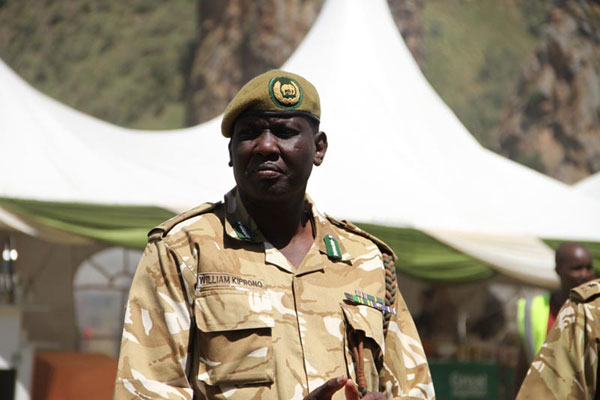Challenges in protecting Kenya's wildlife, biodiversity
 0 Comment(s)
0 Comment(s) Print
Print E-mail CRI, June 28, 2013
E-mail CRI, June 28, 2013
The Kenya Wildlife Service (KWS) conserves and manages Kenya's wildlife for the Kenyan people and the world. Kenya like many other countries in the world faces multiple challenges in wildlife and biodiversity conservation.
 |
|
KWS Director William Kibet Kiprono? at a function held in Hell's Gate National Park in Naivasha, Kenya on June 8, 2013. [Photo/CRIENGLISH.com/ZhengZhi] |
These challenges include climate change, habitat degradation and loss, forest depletion, the volatility of the tourism market, and human/wildlife conflict to name but a few.
KWS, however, plays a crucial role in addressing these issues and its efforts have been widely acknowledged.
China Radio International (CRI) recently talked to William Kibet Kiprono?, director of KWS, in order to gain a better understanding of the organization's mission and plans, which could be followed by other countries facing similar difficulties.
Q: Please introduce to our listeners the Kenya Wildlife Service and some of the tasks you carry out?
A: At KWS our mandate is the conservation and protection of wildlife in the protected and outside the protected areas. We have veterinary services to ensure that our wildlife and our animals are healthy. We have a strategic plan for every species. We are looking at how we can expand the habitat for wildlife because we know with the population pressure; much of the land that was used by wildlife has already been occupied by human settlements.
Q: As both Kenya and China have endangered species, how can the two countries cooperate to protect them?
A: When I met the ambassador he said we need to provide a write-up to the embassy and then they will see how to assist us in terms of conservation; so we need them to be on board and we are very happy they are responding well.
Q: Recently Chinese celebrities such as Li Bingbing and Yao Ming traveled to Kenya to help in the efforts to protect Kenyan wildlife. What do you think about the role of such celebrities in conservation efforts?
A: Definitely they have a following and this is the same following that we want them to reach out to. You can educate through them via the forums that they have. They are able to engage their fans and so that is what we are looking at when we have them in the country. We also want to bring our local celebrities we have; Rudisha, Jelimo, Tergat and so many of our athletes who can do something similar.
The war against wildlife crime cannot be restricted only to a few people; there should be a national and an international approach.
Q: A recent report says the KWS is looking forward to recruiting more rangers. Can you share with us how you plan to do this?
A: We intend to take the first group of 500 rangers from the national youth service this financial year. By July we should be recruiting some of these rangers. We have slightly less than 3,000 rangers and we are covering an area that is more than 6,000 square kilometers. The issue of equipment is also being looked into; we want to look to technology to ensure that we have better equipment. Poachers are also becoming more sophisticated so we want to impart more training to our officers to curb these challenges that are emerging.
Q: How is the current situation regarding human/wildlife conflict in Kenya?
A: It is under control and I can tell you that is an area we are managing quite well. It has really gone down. Most of the land where there is human/wildlife conflict was initially wildlife corridors; so when people settle, it is likely they see the wildlife encroaching but the wildlife know their way. So, what we are trying to do is that we intend to reassess the issues of the corridors so that we can maintain the corridors of these animals where they can disperse to without conflict. We also intend to buy out some of these areas so that we open up more corridors for the wildlife.






Go to Forum >>0 Comment(s)